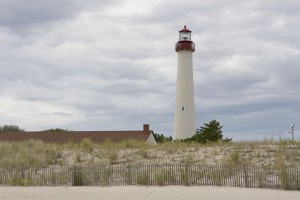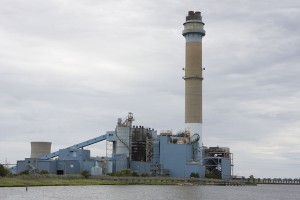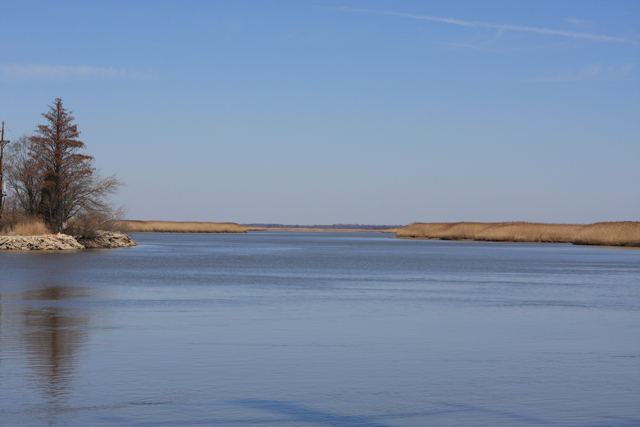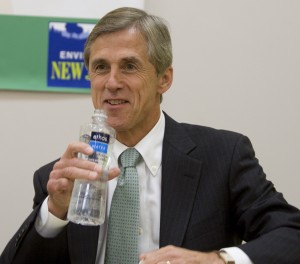DEP Denies Access To Former Corzine Aide Lobbying Records
In another in a series of efforts to mask political intervention and frustrate public oversight and accountability, yesterday DEP denied an Open Public Records Act (OPRA) request. This follows a recent OPRA lawsuit filed to force DEP to disclose similar records (see Star Ledger: N.J. environment group claims DEP denial of records request violated state law

Adam Zellner (R) former Corzine advisor and DEP Deputy Commissioner. Lisa Jackson (L)
The OPRA request sought public records on a meeting between DEP managers and Adam Zellner, a powerful political lobbyist, and former DEP Deputy Commissioner and policy advisor to Governor Jon Corzine (we initially wrote about the Zellner matter here).
The OPRA asked for documents related to an October 15, 2009 DEP meeting. Ordinarily, because of a serious lack of transparency at DEP, such a meeting would be secret, but a source gave me a tip. Here is the full text of the OPRA request:
Mr. Adam Zellner met with DEP officials on October 15, 2009 in the DEP HQ building. I request all records related to Mr. Zellner’s 10/15/09 meeting, as well as all prior correspondence and communications between DEP and Mr. Zellner from January 1, 2009 until the present.
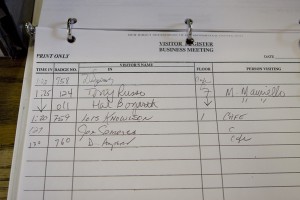
DEP sign in book – 401 East State Street, Trenton
DEP denied the request, despite the fact that the DEP building visitor’s log book requires that all visitors MUST sign in and identify who they are meeting with. Outrageously, one of the bases for the denial is that I didn’t have sufficient information on the meeting – which is the reason I filed the request in the first place! Here is DEP’s OPRA denial:
Since requester is unable to provide a NJDEP Contact Name, Program Area, or subject of meeting, this request has been denied on the basis that the request requires the NJDEP to conduct research & correlate data, which is not required pursuant to N.J.S.A. 47:1A-9 & Mag Entertainment v Div of Alcoholic Beverage Control 375 NJ Super 537 (App Div 3/05). In addition, this request has been denied based on the request being overly broad and unspecific to the records being sought pursuant to N.J.S.A.47:1A-5, N.J.S.A. 47:1A-9 & Gannett N.J. Partners v. Middlesex, 379 N.J. Super 205 (App. Div. July 2005).
(Does anyone recall scandals by former Governor’s aides involving political influence on government decisions?)
Zellner’s meeting with DEP illustrates several key reform issues:
1. Transparency and open government
DEP is a public regulatory agency, not a Las Vegas bawdyhouse. DEP must be transparent.
Currently, DEP typically meets secretly for months in advance with polluters and developers on major projects. These “pre-application meetings” negotiate permit requirements and establish review schedules. At times, the formal public permit process is a sham, where DEP goes through the motions to issue a permit already decided. The public is put at a serious disadvantage by these meetings, and must be given equal information and access to DEP. See this for our transparency petition now pending before DEP Commissioner Mauriello).
2. Ethics – Revolving door restrictions
Zellner was DEP Deputy Commissioner until January 2008, when he went to Governor Corzine’s Office. Current ethics laws seek to prevent even the appearance that state officials gain economic advantage from their state service. Current ethics law has post-employment restrictions (see here) . These requirements must be monitored, enforced and strengthened.
3. Whistleblower protections
DEP staffers witness ethically questionable or corrupt practices on a daily basis, but rightfully don’t want to sacrifice their careers disclosing wrongdoing.
We need to empower the agency professionals and block the current widespread practice of retaliation for conscientious public disclosures of mismanagement, manipulation of science, and threats to public health and the environment. NJ’s current whistleblower laws do not protect employees who disclose such problems publicly. (see: Star Ledger: End Political Influence on DEP Regulators).
4. Integrity in Government decision-making
DEP decisions must be based on law and science, as well as fair and open to all parties.
The process by which DEP makes decisions is critically important. In my experience, the integrity of decisionmaking at DEP has slipped badly in recent years. We must restore the public’s trust and confidence in DEP decisions. Such an effort must include restrictions on what are legally known as “ex parte” communications to DEP.
An ex parte communication is a communication to DEP from any person about a pending DEP matter that occurs in the absence of other parties to the matter and without public notice and opportunity for all parties to participate in the communication. People often refer to these communications as “one-sided, “off-the-record”, or private communications between a DEP staffer and any person concerning a matter that is pending or impending before the DEP.
According to California regulations:
Rules regarding ex parte communications have their roots in constitutional principles of due process and fundamental fairness. With public agencies, ex parte communications rules also serve an important function in providing transparency. Ex parte communications may contribute to public cynicism that decisions are based more on special access and influence than on the facts, the laws, and the exercise of discretion to promote the public interest.
Ex parte communications are fundamentally offensive in adjudicative proceedings because they involve an opportunity by one party to influence the decision maker outside the presence of opposing parties, thus violating due process requirements (See this for excellent California Guidance on prohibiting Ex Parte communications)
5. DEP Independence from political interference
DEP is not a political arm of the Governor or legislature, it is a regulatory agency. A clear separation is required.
Recently, the Governor’s office and powerful legislators have intervened and called the shots at DEP. One of the worst recent examples of this was the Encap debacle, a “scandalmongers dream”. DEP Commissioner Campbell overrode staff objections at the behest of Governor McGreevey.
On the financial side, state officials such as … DEP chief Bradley Campbell approved a $212 million state loan package to EnCap in 2005 even though regulators warned the loan was risky and was made without sufficient collateral.
Campbell, before signing off on the loan, called it “a scandal monger’s dream” in a note to McCormac. “Why in the world would we take the risk?” he wrote “What am I missing here?” Both officials have said their reservations were overruled by the governor’s office, which championed the project throughout the tenures of both McGreevey and Richard Codey. [link to Bergen Record story here]
This lack of independence at NJ DEP contrasts sharply with the policy set by William Ruckelshaus, the first EPA first Administrator under Richard Nixon. Please read this piece, for an excellent history and analysis of the issues involved:
“… In its failure to show the same caution in its interventions with EPA, the Bush Administration has paid a price. While presumably maximizing the immediate political benefits of Agency decisions, it has depleted the Agency’s capital of legitimacy, with a resulting loss of credibility with other governmental institutions and the public. Congressional oversight hearings have multiplied, drawing unflattering scrutiny of Agency decisions, diverting Agency resources, and distracting
EPA leadership. As already mentioned, the courts have reversed an increasing percentage of EPA decisions, many on grounds that the Agency failed to follow the statute’s plain meaning. The Agency’s loss of credibility in the courts now looms as a factor in judicial reversal of cases that the Agency might otherwise have been expected to win. Criticisms of EPA decisionmaking have also spilled into the press and adversely affected the public’s views about whether the Administration is doing a good job with the environment. A September 2007 public opinion poll showed that only 20% approved of the president’s handling of environmental issues (compared to over 50% who disapproved), down from an environmental job approval rating of over 50% in the first year of the Bush Administration. While foregoing the ability to maximize political benefits over the short term, a more restrained exercise of presidential influence that maintains agency legitimacy and respects the Agency’s familiarity with the issues is likely to provide greater political benefits over the long term and thus should be the preferred strategy of succeeding administrations, whether Democrat or Republican. This is exactly the conclusion reached in 1983 by President Reagan, the president most identified with bringing the presidential control model into vogue, after the politically disastrous events surrounding the resignation of his first appointee as EPA Administrator, Anne Gorsuch. In announcing her replacement, Ruckelshaus, President Reagan promised a new era of environmental protection and gave Ruckelshaus substantial discretion in managing the Agency–according to his principles. Let the new era begin.
The DEP Commissioner needs to stand up and restore DEP’s independence and integrity.

